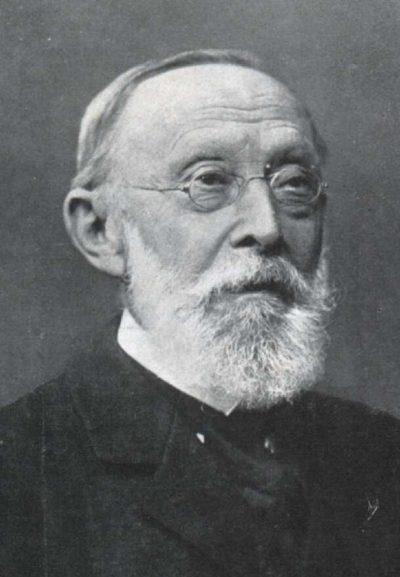Rudolf Virchow (Rudolf Ludwig Carl Virchow)

Rudolf Ludwig Carl Virchow (English /ˈvɪərkoʊ, ˈfɪərxoʊ/; German: [ˈvɪɐ̯çoː]; 13 October 1821 – 5 September 1902) was a German physician, anthropologist, pathologist, prehistorian, biologist, writer, editor, and politician, known for his advancement of public health. He is known as “the father of modern pathology” because his work helped to discredit humourism, bringing more science to medicine. Rudolf Virchow is also known as the founder of social medicine and veterinary pathology, and to his colleagues, the “Pope of medicine”. Born and raised in Schievelbein (Świdwin) as an only child of a working-class family, he proved to be a brilliant student. Dissuaded by his weak voice, he abandoned his initial interest in theology and turned to medicine. With special military scholarship, he earned his medical degree from Friedrich-Wilhelms Institute (Humboldt University of Berlin) under the tutelage of Johannes Peter Müller. He worked at the Charité hospital under Robert Froriep, whom he eventually succeeded as the prosector. Although he failed to contain the 1847–1848 typhus epidemic in Upper Silesia, his report laid the foundation for public health in Germany, as well as his political and social activities. From it, he coined a well known aphorism: “Medicine is a social science, and politics is nothing else but medicine on a large scale”. He participated in the Revolution of 1848, which led to his expulsion from Charité the next year. He published a newspaper Die medicinische Reform (Medical Reform) during this period to disseminate his social and political ideas. He took the first Chair of Pathological Anatomy at the University of Würzburg in 1849. After five years, Charité invited him back to direct its newly built Institute for Pathology, and simultaneously becoming the first Chair of Pathological Anatomy and Physiology at Berlin University. The campus of Charité is now named Campus Virchow Klinikum. He cofounded the political party Deutsche Fortschrittspartei, by which Rudolf Virchow was elected to the Prussian House of Representatives, and won a seat in the Reichstag. His opposition to Otto von Bismarck’s financial policy resulted in an anecdotal “Sausage Duel” between the two. But he ardently supported Bismarck in his anti-Catholic campaigns, the social revolution he himself named as Kulturkampf (“culture struggle”).
A prolific writer, his scientific writings alone exceeded 2,000 in number. Among his books, Cellular Pathology published in 1858 is regarded as the root of modern pathology. This work also popularised the third dictum in cell theory: Omnis cellula e cellula (“All cells come from cells”); although his idea originated in 1855. He founded journals such as Archiv für pathologische Anatomie und Physiologie und für klinische Medizin (now Virchows Archiv), and Zeitschrift für Ethnologie (Journal of Ethnology). The latter is published by German Anthropological Association and the Berlin Society for Anthropology, Ethnology and Prehistory, the societies of which he also founded. Rudolf Virchow was the first to precisely describe and give names of diseases such as leukemia, chordoma, ochronosis, embolism, and thrombosis. He coined scientific terms, chromatin, agenesis, parenchyma, osteoid, amyloid degeneration, and spina bifida. His description of the transmission cycle of a roundworm Trichinella spiralis established the importance of meat inspection, which was started in Berlin. He developed the first systematic method of autopsy involving surgery of all body parts and microscopic examination. A number of medical terms are named after him, including Virchow’s node, Virchow–Robin spaces, Virchow–Seckel syndrome, and Virchow’s triad. He was the first to use hair analysis in criminal investigation, and recognised its limitations. His laborious analyses of the hair, skin, and eye colour of school children made him criticise the Aryan race concept as a myth. He was an ardent anti-evolutionist. He referred to Charles Darwin as an “ignoramus” and his own student Ernst Haeckel, the leading advocate of Darwinism in Germany, as a “fool”. He discredited the original specimen of Neanderthal man as nothing but that of a deformed human, and not an ancestral species. Rudolf Virchow was an agnostic. In 1861, he was elected a foreign member of the Royal Swedish Academy of Sciences. In 1892, he was awarded the Copley Medal of the British Royal Society. He was elected to the Prussian Academy of Sciences in 1873, and entitled an ennoblement “von Virchow”, but which he declined.
Born
- October, 13, 1821
- Świdwin, Poland
Died
- September, 05, 1902
- Berlin, Germany
Cemetery
- Alter Sankt-Matthäus-Kirchhof
- Berlin, Germany



